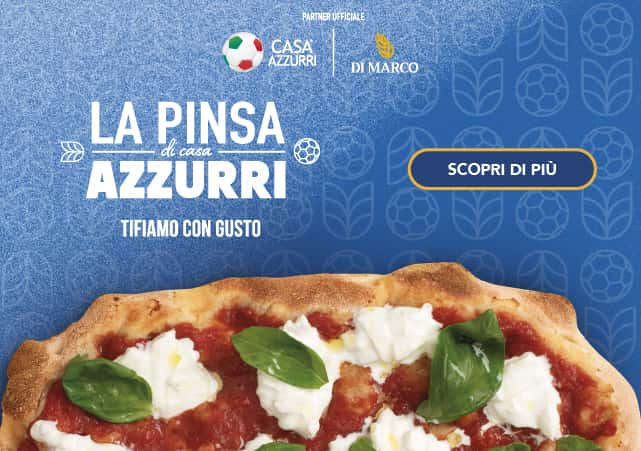According to data reported by the Ministry of Health (via: Corriere.it), more than 1 million Italians suffer from lactose intolerance and over 3 million are gluten intolerant. Despite some similarities with gluten intolerant people, it should be emphasised that coeliacs are a category in their own right, with specific needs and dietary restrictions. These numbers highlight the size of the public requiring different food options and underline the importance of offering gluten- and lactose-free alternatives.
600,000 Italians suffer from coeliac disease
Gluten sensitivity is the body's inability to metabolise foods containing it. Gluten is a protein found mainly in cereals such as wheat, corn and barley; its role in bread-making is central, as it gives the dough the elastic properties that facilitate the rising process.
Gluten intolerance results in an adverse reaction to the intake of gliadin, which is one of the two proteins that make up gluten. The reaction mainly affects the gastrointestinal system but can manifest itself with systemic symptoms such as asthenia, drowsiness and skin rashes.
Coeliac disease is considered a severe form of gluten sensitivity, an autoimmune disease with a genetic predisposition, which affects around 1% of the entire population (Italian Istituto Superiore di Sanità). Since no real cure is available, the only truly effective strategy is to eliminate gluten from one's diet.
Why offer customers a gluten-free pinsa: 4 good reasons
What has just been said explains why the catering industry, and in particular pinserie and pizzerias, need a gluten-free pinsa. Indeed, modern catering is characterised by an increasing demand for gluten-free food, both from customers with confirmed food intolerances and from those following specific diets.
It has been said that the incidence of coeliac disease on the total population is estimated at 1%. Quoting the Italian Health Institute, this means that in Italy 'the total number of coeliacs is around 600,000, compared to over 233,000 diagnosed to date'. Although the percentage seems low, the overall number is significant and requires actions to be taken by the hospitality industry.
Let us explore the reasons in detail.
Improved customer experience
Being sensitive to the needs of customers with food intolerances improves the overall experience and gives you a competitive advantage. Offering a gluten-free option shows sensitivity and commitment to customer wellbeing, creating a good reputation and customer loyalty to your business.
No missed opportunities
When it comes to eating in restaurants, people tend to do so in company, and it is this social dynamic that makes the impact of food sensitivities, such as coeliac disease, even more significant.
When a person with food intolerances is faced with a limited or unsuitable offer, the impact of the restrictions extends to the entire group, which is naturally predisposed to look for alternatives. This leads to a loss of potential customers as well as a negative impact on the restaurant's reputation.
A moral duty
For a restaurateur, meeting the needs of customers with coeliac disease or other food sensitivities is not only a matter of business strategy, but also a moral duty, since every person has the right to enjoy a satisfying experience. This comes from the principle of inclusiveness, which is only fulfilled if suitable options are offered to everyone. This also suggests a positive idea of mutual respect, which is enhanced not only by offering gluten-free food, but also by providing clear and precise information on the menus.
Attracting a wider public
Meeting the dietary needs of everyone is an opportunity for restaurateurs. In this way, they can show their ethical commitment and attract a wider public. Customers with food sensitivities, besides being numerous, are often very loyal to restaurants that respect their dietary restrictions. The word-of-mouth generated by a positive experience can lead to new customers and improve the restaurant's reputation as an inclusive place.
Gluten-free pinsa, options for restaurants
Creating a pinsa without gluten is a complicated challenge, because of the fundamental role of this protein (or complex of proteins) in the leavening process. However, the goal is to create a product that is suitable for everyone's diets without compromising the characteristics that have made pinsa romana a worldwide success: lightness, crispiness and easy digestibility.
To tackle this challenge, we collaborate with the company Romana Gluten Free, which is co-owned by Di Marco and makes (among other products) gluten- and lactose-free pinsa romana bases.
Romana Gluten Free was born out of the need to offer gluten-free consumers high quality products that do not require any sacrifice in terms of taste and experience compared to traditional products. Therefore, the gluten-free pinsa bases are the result of thorough research and are made with ingredients such as pea protein, quinoa flour, rice sourdough and a part of vegetable fibre from beetroot and psyllium. Romana Gluten Free mixes and products do not contain deglutinated wheat or gums such as xanthan and guar; the sugar content is reduced and the richness in fibre and protein is preserved.
The gluten- and lactose-free pinsa bases are dedicated to the catering industry, they are pre-cooked and immediately frozen, available in handy 10-pieces/250-grams packs. Once defrosted, the product must be consumed within 48 hours, and the cooking process is basically like the one for the traditional bases: about 5 minutes at 250°C (or less in a professional oven). Then, the pinsa can be seasoned as desired, with a wide variety of options to suit customers' tastes and preferences. Really every customer’s.


